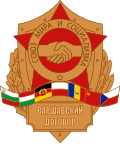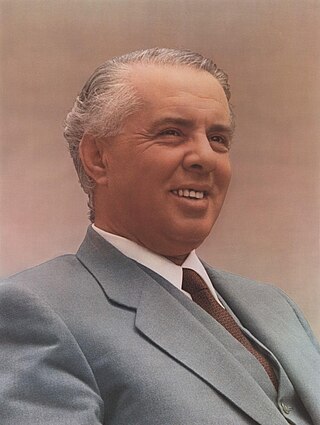
Enver Hoxha was an Albanian politician who was the ruler of Albania from 1944 until his death in 1985. He was the First Secretary of the Party of Labour of Albania from 1941 until his death, a member of its Politburo, chairman of the Democratic Front of Albania, and commander-in-chief of the Albanian People's Army. He was the twenty-second prime minister of Albania from 1944 to 1954 and at various times was both foreign minister and defence minister of the country.

Ramiz Alia was an Albanian politician serving as the second and last leader of the People's Socialist Republic of Albania from 1985 to 1991, serving as First Secretary of the Party of Labour of Albania. He was also the country's head of state from 1982 to 1992. He had been seen as a successor by Enver Hoxha and took power after Hoxha died.

Nexhmije Hoxha was an Albanian communist politician. For many years she was the wife of Enver Hoxha, the first leader of the Socialist People's Republic of Albania and the First Secretary of the Party of Labour of Albania. Very close to her husband, she attempted to remain politically influential after his death in 1985. She was one of the few spouses of a ruling communist party leader with a high political profile of her own.

Sali Ram Berisha is an Albanian cardiologist and conservative politician who served as the president of Albania from 1992 to 1997 and 32nd prime minister from 2005 to 2013. Berisha serves as Chairman of the Democratic Party of Albania since 2022 and has held the position previously from 1990 to 2013. He also serves as the incumbent Leader of Opposition in the Albanian parliament.
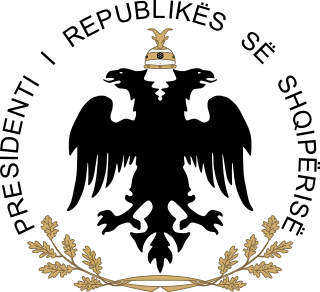
The president of Albania, officially styled the President of the Republic of Albania, is the head of state, commander-in-chief of the military and the representative of the unity of the Albanian people.

Fatos Thanas Nano is an Albanian socialist politician who served as Prime Minister of Albania in 1991, from 1997 to 1998 and from 2002 to 2005. He was the first leader and founder of the Socialist Party of Albania and a member of the Albanian Parliament from 1991 to 1993 and 1997 to 2009. He reformed the anti-revisionist Marxist-Leninist ideology of the Labor Party of Albania into social democracy for its successor, the Socialist Party. During his leadership, the Socialist Party, as a result of reforms, joined the Socialist International and Party of European Socialists. Nano was a candidate in the 2007 presidential election but did not win. He again tried in the 2012 presidential election, but he did not even qualify as a candidate, because the leaders of parties in Parliament obstructed their respective MPs to elect him as candidate in the elections.

The Socialist Party of Albania is a social-democratic political party in Albania. It has been described as centre-left. It was founded on 13 June 1991. The PS is an associate of the Party of European Socialists and a member of the Socialist International, and holds pro-European views.

The Democratic Party of Albania is a conservative political party in Albania. It has been the largest opposition party in the country since 2013.
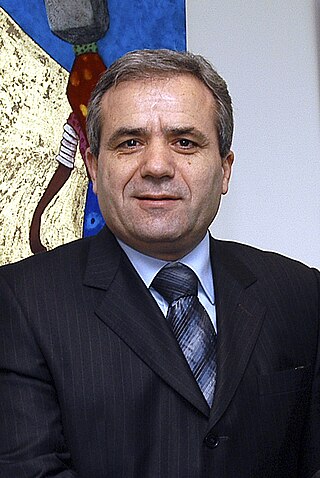
Kastriot Selman Islami is an Albanian politician. Formerly member of the Communist Party of Albania, turned moderate Socialist. He was Chairman of the Parliament of Albania from April 17, 1991 to April 6, 1992. On April 3, 1992, when the last communist president, Ramiz Alia resigned, Islami served as acting president for three days. During the presidency of Sali Berisha (1992–1997), Islami had no important positions in the government, but from 1997 to 2005 he was an important person in the government again holding several Ministerial positions in the Socialist "NANO government". Most prominently he was foreign minister from 2003 to 2005, but lost his position in the cabinet when a new government was formed with Berisha as prime minister after the 2005 elections. He returned to Democratic Party on 7 May 2013 after he left the Socialist Party in March.

The Party of Labour of Albania (PLA), also referred to as the Albanian Workers' Party (AWP), was the ruling and sole legal party of Albania during the communist period (1945–1991). It was founded on 8 November 1941 as the Communist Party of Albania but changed its name in 1948. The party was dissolved on 13 June 1991 and succeeded by the Socialist Party of Albania and the new Communist Party of Albania. For most of its existence, the party was dominated by its First Secretary, Enver Hoxha, who was also the de facto leader of Albania from 1944 until his death in 1985.

In 1997, widespread civil unrest struck Albania due to economic problems in the country, that were caused by the collapse of pyramid schemes. Due to the large quantities of money robbed from the government to fund the schemes, the Democratic Party's government collapsed in January 1997. More than 2,000 people were killed in the conflict until its end in August 1997. The creation of a new government came as the revolutionaries surrounded Tirana. Various other sources also describe the violence that ensued as a rebellion or even a civil war.
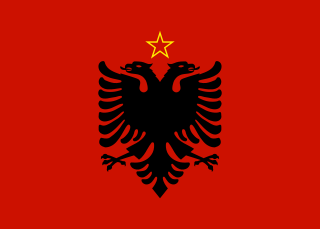
The People's Socialist Republic of Albania, officially the People's Republic of Albania from 1946 until 1976, was the one-party communist state in Albania from 1946 to 1991. It succeeded the Democratic Government of Albania (1944–1946).

Fatos Lubonja is an Albanian writer and dissident.
In 1991, the Socialist Party of Albania, with specific social democratic ideology took control of the country through democratic elections. One year later the Democratic Party of Albania won the new elections. After 1990, Albania has been seeking a closer relationship with the West. What followed were deliberate programs of economic and democratic reform, but the implementation of capitalism led to the proliferation of pyramid schemes. Chaos in late 1996 to early 1997, as a result of the collapse of these pyramid schemes, alarmed the world and prompted the influx of international peacekeeping forces. In 1995, Albania was accepted into the Council of Europe and requested membership in NATO and is a potential candidate country for accession to the European Union. The workforce of Albania has continued to emigrate to Western countries, especially Greece and Italy.

Bashkim Gazidede was an Albanian mathematician, author, politician, and a chief of the national intelligence agency.
Parliamentary elections for a Constituent Assembly were held in Albania on 2 December 1945. Voters were presented with a single list from the Democratic Front, organized and led by the Communist Party of Albania. The Front won all 82 seats.
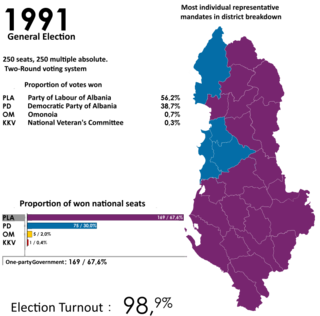
Constitutional Assembly elections were held in the People's Socialist Republic of Albania on 31 March 1991, with later rounds on 7 April and 14 April. They were the first multi-party elections since 1923, and were held after the formation of new political parties was legalised on 11 December 1990 following a strike by 700 students at the University of Tirana over poor dormitory conditions and a power failure, which subsequently became politicised under the influence of Sali Berisha.

Parliamentary elections were held in Albania on 22 March 1992, with a second round of voting for eleven seats on 29 March. The result was a victory for the opposition Democratic Party of Albania, which won 92 of the 140 seats. After the elections Aleksandër Meksi became Prime Minister and Sali Berisha became President.

Pirro Kondi was an Albanian politician of the Albanian Party of Labour (PPSh). Coming from a family with strong communist background, he became member of the Albanian Parliament and a candidate-member of the Politburo of the Party of Labour of Albania by the '80.
The Bufi Government better known as the Government of Stability was an interim government formed after the resignation of the previous Nano government due to the aggravated situation in the country after the events of 2 April 1991 where 4 opposition supporters were killed in Shkodër during a anti-communist protest that led to the burning of the Shkodra Labor Party Committee. The Nano government resigned on 4 June 1991, and the next day the then-President Ramiz Alia, began negotiations to form a comprehensive government whose main objective would be to restore stability to the country, from which it took the name "Stability Government". Ylli Bufi was accepted also by the opposition to be appointed as Prime Minister, while one of the most prominent figures of the Democratic Party, such as Gramoz Pashko, was appointed Deputy Prime Minister.

